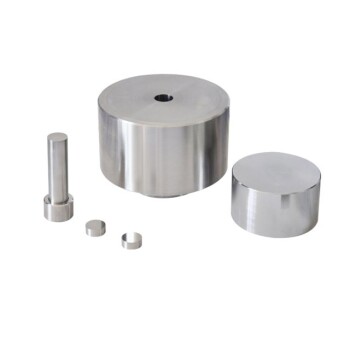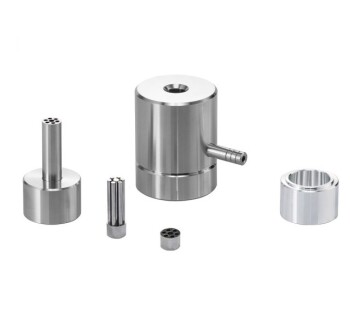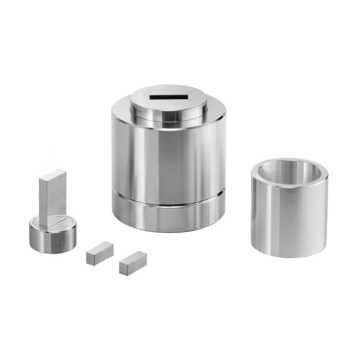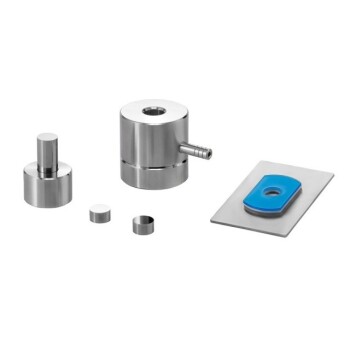In any industrial inquiry, a laboratory press serves as the critical bridge between theoretical research and viable production. Its primary advantages are the ability to provide absolute control over process variables, ensure repeatable and accurate results, and operate with a versatility that supports a wide range of material and process development tasks.
The true value of a laboratory press is not merely its capacity to exert force, but its function as a controlled, miniature manufacturing environment. It empowers you to test, validate, and de-risk material formulations and production processes on a small scale before committing to expensive, full-scale implementation.

The Foundation of Industrial R&D: Unpacking the Core Advantages
A laboratory press is more than just a piece of equipment; it's a foundational tool for confident decision-making. Its benefits directly address the core challenges of industrial research and quality control.
Achieving Absolute Precision and Control
The single most important advantage is unwavering control. Industrial processes are sensitive to minute changes in pressure, temperature, and application speed.
A quality laboratory press allows for the precise adjustment of these variables. This isolates the impact of each parameter, removing guesswork and leading to a fundamental understanding of the material or process being studied.
Ensuring Repeatable and Scalable Results
Repeatability is the cornerstone of scientific validation and industrial scaling. A lab press ensures that the exact same conditions can be replicated time and time again.
This reproducibility is essential for creating consistent test samples, validating findings, and establishing a reliable baseline. If a result can be consistently achieved in the lab, there is a much higher probability it can be successfully scaled to the factory floor.
Unmatched Versatility for Diverse Applications
Modern industrial R&D involves a vast array of materials and formats. Laboratory presses are designed for this versatility, capable of handling everything from polymers and composites to ceramics and pharmaceuticals.
Whether you are creating pellets, pressing powders, performing lamination, or conducting crush tests, the same machine can often be adapted for multiple applications, maximizing its utility.
Driving Efficiency and Return on Investment
Beyond its technical capabilities, a laboratory press delivers significant operational and financial benefits that directly impact the bottom line.
Accelerating the Development Cycle
Testing variables on a full production line is incredibly slow and expensive. A lab press allows for rapid, small-batch testing that drastically reduces material waste and equipment downtime.
This ability to quickly iterate and validate ideas shortens the entire development cycle, delivering a faster time-to-market for new products.
Built for Durability and Long-Term Use
Laboratory presses are capital equipment designed for demanding environments. Their durable construction and use of high-quality components ensure long-term reliability with proper maintenance.
This represents a predictable, long-term investment rather than a disposable tool, providing consistent performance for years.
Streamlining Operation and Safety
While capable of complex tasks, modern presses are engineered for ease of operation. Intuitive controls and programmable cycles reduce the potential for operator error.
Furthermore, integrated safety features like emergency stops, safety shields, and pressure limits are standard, protecting both the operator and the equipment.
Understanding the Practical Trade-offs
No tool is without its limitations. An objective assessment requires understanding the trade-offs inherent in using a laboratory-scale device.
Scale is Not Production
A lab press excels at creating controlled, small-batch samples. However, it cannot perfectly replicate all the dynamic complexities of a continuous, high-volume production line.
Results from a lab press are an excellent indicator, but they must always be validated at an intermediate or pilot scale before full production rollout.
The Cost of Precision
High-precision control and durable construction come at a price. The initial investment for a high-quality laboratory press can be substantial compared to less precise equipment.
This cost, however, is typically justified by the significant savings in reduced material waste, accelerated development timelines, and prevention of costly production-scale failures.
Making the Right Choice for Your Goal
To maximize the value of a laboratory press, align its capabilities with your specific industrial objective.
- If your primary focus is material development: Use the press to create highly consistent samples for comparative testing of properties like tensile strength, flexibility, or chemical resistance.
- If your primary focus is process optimization: Leverage the precise control of pressure, temperature, and time to simulate and perfect production parameters on a small, manageable scale.
- If your primary focus is quality control: Employ the press to reliably test incoming raw materials or samples from the production line against a known, established standard.
Ultimately, a laboratory press gives you the data-driven confidence to make critical decisions about your materials and processes.
Summary Table:
| Advantage | Key Benefit |
|---|---|
| Precision and Control | Allows exact adjustment of pressure, temperature, and speed for reliable testing. |
| Repeatability and Scalability | Ensures consistent, reproducible results that can be scaled to production. |
| Versatility | Handles diverse materials like polymers, composites, and ceramics for various applications. |
| Efficiency and ROI | Accelerates development cycles, reduces waste, and lowers costs through small-batch testing. |
| Durability and Safety | Built for long-term use with intuitive controls and integrated safety features. |
Ready to elevate your laboratory's capabilities? KINTEK specializes in high-performance lab press machines, including automatic lab presses, isostatic presses, and heated lab presses, designed to meet the precise needs of industrial R&D and quality control. By partnering with us, you'll achieve faster time-to-market, reduced material waste, and enhanced process reliability. Contact us today to discuss how our solutions can drive your success!
Visual Guide

Related Products
- Laboratory Hydraulic Press 2T Lab Pellet Press for KBR FTIR
- Manual Heated Hydraulic Lab Press with Integrated Hot Plates Hydraulic Press Machine
- Lab Anti-Cracking Press Mold
- Automatic Laboratory Hydraulic Press Lab Pellet Press Machine
- Laboratory Hydraulic Split Electric Lab Pellet Press
People Also Ask
- What is the role of a hydraulic press in KBr pellet preparation for FTIR? Achieve High-Resolution Chemical Insights
- What are some laboratory applications of hydraulic presses? Boost Precision in Sample Prep and Testing
- How do hydraulic press machines ensure precision and consistency in pressure application? Achieve Reliable Force Control for Your Lab
- Why must a laboratory hydraulic press be used for pelletizing samples for FTIR? Achieve Precision in Spectral Data
- How is a laboratory hydraulic press used for polymer melt crystallization? Achieve Flawless Sample Standardization



















